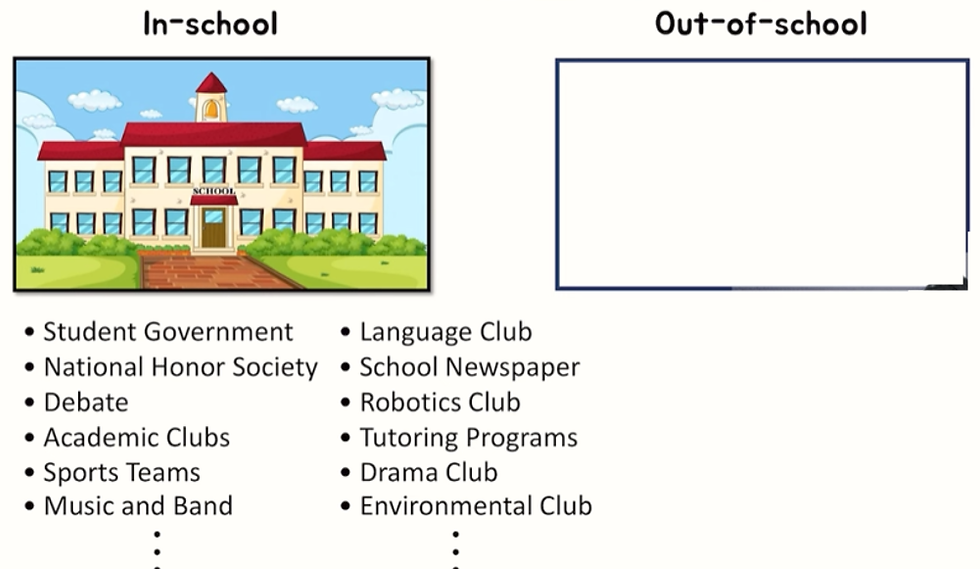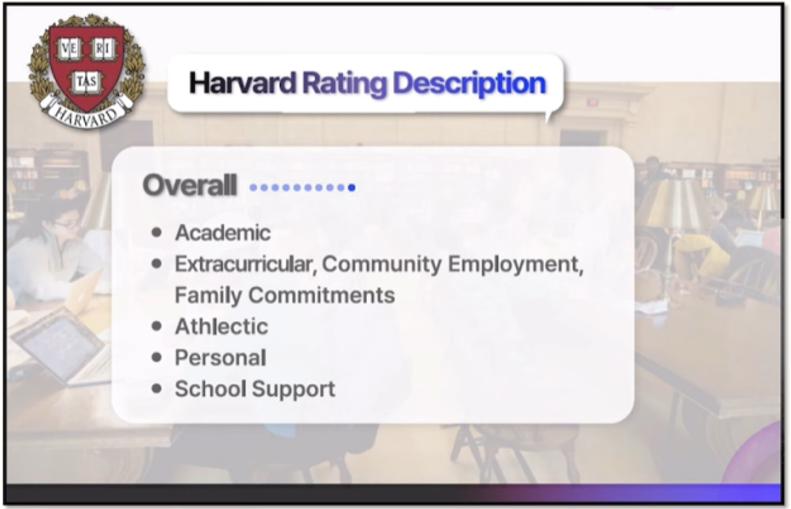
A ONE Institute
Nov 9, 2024
When all activities are within school
Today, I’ll address a common concern for parents and students preparing for U.S. college admissions: what to do if students have only school-based activities for their ECs.
I often receive questions from parents worried that their children don’t have extracurriculars outside of school, only activities within school. Today, I’ll share my thoughts on this topic.

When it comes to ECs, students can be involved in both school-based and outside-school activities.
Examples of school-based activities include:
Student Government
National Honor Society
Debate Club
Academic Clubs – Olympiads, Science, Math, Social Studies, Language Clubs
Music and Band – Orchestra, Music Band, Marching Band, etc.
Language Club – Newspaper
Robotics Club
Tutoring Program
Drama Club
Environmental Club, etc.
These are considered school-based ECs. However, such activities can also extend outside of school.

Let’s look at how to describe high school activities using the Common App as an example.
When listing activities, it asks what students have done outside the classroom, not necessarily outside of school. You need to choose the type of activity, then fill in the student’s position, the name of the organization, and a description of what they did. You also specify when (school year, school break, year-round) and how many hours they were involved.

The Common App allows up to 10 activities. While it’s ideal to fill all 10, there’s no need to add unnecessary activities. For instance, MIT requests only four significant ECs, acknowledging that listing 10 can sometimes feel excessive. Focusing on a few meaningful activities can be more effective. While it’s good to complete the Common App with impactful activities at the top, don’t force entries if there aren’t enough.

Instead of focusing on quantity, prioritize quality. I’ll explain how to concentrate efforts on the most meaningful activities.
Harvard, for example, rates students in categories to determine an overall score that gauges fit for their school.
The categories include:
Academic
EC, Community Employment, Family Commitments
Athletic
Personal
School Support (Personal and School Support may be combined)

In simplified terms, Harvard’s categories can be broken down into four main ones:
Academic
Extra Curricular
Athletic
Personal
All activities that meet these categories can be accomplished within school. Academics might include SAT, ACT, AMC, Olympiad, or Research. EC covers school clubs, Athletics can be done within or outside school, and Personal can also be developed within school.

For academics, ECs, and athletics, evaluation factors include longevity, leadership roles, and achievement at the state or national level. These areas have more concrete criteria since they are often evidenced by awards or recognitions. The Personal category can be harder to define, but Harvard provides a Personal Rating description on their website, which I’ve outlined below:
Personal Rating Levels:
Level 1: Exceptional character, great courage, extraordinary compassion, unconditional support from recommenders.
Level 2: Strong leadership, maturity beyond age, resilience, and solid recommendation support.
Level 3: Positive yet somewhat neutral traits.
Level 4: Concerning personality traits.

Since it’s challenging to convey Personal aspects solely through essays, other elements, such as recommendation letters, are essential. Teachers who write strong letters of recommendation provide official evidence of a student’s character, especially when they describe dedication and positive involvement in the school community.
When students hold a leadership position, it adds weight as evidence of both recognition from teachers and peer acknowledgment. A variety of leadership roles are highly valued, as shown in the chart above.
Leadership positions are essential because they reflect both teacher recognition and peer acknowledgment, serving as strong evidence of character. All of Harvard’s scoring criteria can be met through school activities alone, covering every category. It’s entirely possible to secure a good college admission by scoring well through school-based activities alone.
However, don’t focus solely on school ECs—consider the often-overlooked Personal aspect. Recognition from friends and teachers is valuable in the Personal category.
You can express evidence through essays or resumes by stating your title or community role. Leadership positions particularly enhance credibility.
One of our students served as a school ambassador. In addition to creating media and club promotion materials, they took on roles that extended their influence within the school, eventually establishing a Media Marketing Department and becoming its president. In their essay, they described how their passion and efforts led them to this role.
While this student’s activity wasn’t athletic or academic, their leadership position within the school significantly contributed to their scores in both the Extra Curricular and Personal categories.
In summary, it’s entirely possible to earn high scores across all categories with only school-based activities. Don’t worry too much about not having activities outside of school; in fact, the opposite situation—having only outside activities without school involvement—could be more concerning. Colleges primarily want to see how applicants engaged within their own high school communities, so focus on meaningful school-based ECs.
This post was for those concerned about the lack of EC activities outside of school. I hope this was helpful. If you have any questions, please feel free to reach out to A-One Institute. Thank you.
